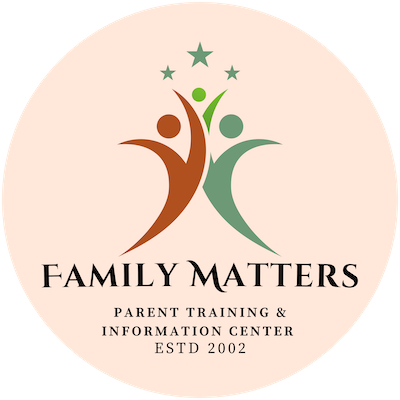Secondary Transition planning is a partnership between students with disabilities, their families, the school, higher education, training programs, employers and community service providers. The secondary transition planning process is a part of the student’s IEP and will be included in the student's IEP in the year they turn 14 and 1/2.
The process of secondary transition includes assessments, family and student involvement, interagency collaboration, and providing community experiences. Transition services include planning for academic and non-academic courses and learning experiences, employment and related training opportunities, and independent living activities. Secondary transition planning should be a bridge from school programs to participation in opportunities of adult life.
Family Matters creates a quarterly newsletter titled Transition Newsblast. The newsblast shares important transition-related resources and highlights a youth who is navigating their transition education plan. Click on the button below to check it out!
Self-Advocacy is the key to a successful transition plan. Click on the button below to learn more about self-advocacy.
Resources
Five Film Modules show how involving students in the IEP process increases student engagement, empowers students to achieve their goals, and prepares youth to successfully transition to adulthood.
A toolkit that includes effective practices for preparing students for competitive integrated employment by providing transition services collaboratively.
Strategies for people with disabilities whose employers have turned down their request for job accommodation.
Information on career exploration, employment, and vocational rehabilitation for youth and young adults with disabilities.
Information to help youth develop self-advocacy skills and gain a better understanding of how to more effectively participate to increase success in the classroom, at home, and in the community.
Information on the law requiring competitive and integrated employment as the first option for persons with disabilities of working age.
Offers guidance on job accommodations and disability employment issues.
Seeks to improve employment outcomes for youth and young adults with disabilities by helping states build capacity in their youth-serviced delivery and workforce systems. (Resource tab includes information valuable to families.)
Connects callers to independent living resources such as accessible transportation. The phone number for DIAL is (888)-677-1199.
Tools for effective services and instruction for students and out-of-school youth with disabilities.
The Alliance is a statewide network of self-advocates, advocacy groups and allies in Illinois.
NACDD is the national association for the 56 Councils on Developmental Disabilities (DD Councils) across the United States and its territories. The DD Councils support programs that promote self-determination, integration, and inclusion for all people with developmental disabilities. The website includes self-advocacy resources.

This checklist includes information on trusts, wills, estates, and medical directives
Resources for College

